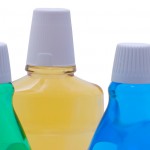
Halitosis is a common problem with a recent review (Dental Elf – 28th Aug 2017) estimating a prevalence of 31.8% (95%CI; 24.6 to 39.0%). The oral cavity is the source of majority of cases of halitosis with volatile sulphur compounds (VSCs) hydrogen sulphide (H2S), methyl mercaptan (CH3SH), and dimethyl sulphide ((CH3)2S) being produced by gram-negative anaerobic oral bacteria from sulphur containing amino acids. Chlorine dioxide (ClO2) is a selective oxidizing agent that rapidly reacts with three amino acids: cysteine, tyrosine, and tryptophan to give rise to its antibacterial effect it also oxidises the precursors of VSCs.
The aim of this review was to investigate the efficacy of chlorine dioxide mouthwashes in patients with halitosis.
Methods
A protocol was registered with PROSPERO and searches conducted in the CENTRAL, Medline, Embase, Scopus and Web of Science databases with no restrictions. Randomised controlled trials (RCTs) in patients aged 18 and over comparing chlorine dioxide-containing mouth- wash with other mouthwashes, placebo, or no-treatment groups were considered. Two reviewers independently selected studies extracted data and assessed risk of bias using the Cochrane risk of bias tool (RoB2). The primary outcome were organoleptic testing scores (OLS) and volatile sulphur compounds (VSCs) levels Mean-difference (MD) and standardised mean-difference (SMD) meta-analyses were conducted on the data with a predefined confidence interval of 95%.
Results
- 10 studies (2 parallel, 8 crossover) involving a total of 297 patients were included.
- All 10 studies were considered to have some concerns, but none were considered to be at high or low risk.
- No side-effects were reported in any of the studies.
- 7 studies (234 patients) contributed to the meta-analysis.
- Meta-analysis showed a significant improvement in organoleptic scores (OLS) after one day and one week but not at two weeks (see table below)
| OLS data | No. of studies | MD (95%CI) |
| One day | 3 | -0.82 (-1.04 to -0.6) |
| One week | 3 | -0.24 (-0.41 to -0.07) |
| Two weeks | 3 | -0.72 (-1.45 to 0.02) |
- One-day data (3 studies) showed a significant difference in H2S, SMD = -1.81 (95%CI: -2.52 to -1.10) but not in CH3SH one-day data, SMD = -7.26 (95%CI: -18.93 to 4.4).
Conclusions
The authors concluded: –
The findings suggest that chlorine dioxide mouthwashes should receive a more prominent role in the supportive therapy of oral halitosis. Our results show that it is effective against halitosis in the short term compared to the placebo. Especially patients with an elevated H2S level can benefit from a targeted treatment because chlorine dioxide demonstrates greater efficacy in that compound.
Comments
Previously we have considered a Cochrane review (Dental Elf – 13th Jan 2020) which looked more broadly at interventions to prevent and control halitosis. That review included 44 RCTs finding only very-low certainty evidence for mouthwashes. This new review includes 10 studies, one was published after the Cochrane review and of the remainder just two were included in the Cochrane publication. The authors have pre-registered their protocol and followed a standard methodology. Searching a good range of major databases. While they did not exclude English language publications all the included studies were published in English. Only a small number of studies were identified, and they are generally small in size ranging from 15–48 participants. While the studies were mainly of a cross-over design the authors highlight some concerns relating to carryover effects. Seven of the 10 included studies were compared to placebo so there are limited comparisons with other mouthwashes. The limited number and quality of the available studies mean that these findings should be viewed cautiously. Both this and the Cochrane review highlight the limited high quality research in this area pointing to the need for well conducted and reported comparative studies to help clarify the most effective treatments for the prevention and management of halitosis.
Link
Primary Paper
Szalai E, Tajti P, Szabó B, Hegyi P, Czumbel LM, Shojazadeh S, Varga G, Németh O, Keremi B. Daily use of chlorine dioxide effectively treats halitosis: A meta-analysis of randomised controlled trials. PLoS One. 2023 Jan 12;18(1):e0280377. doi: 10.1371/journal.pone.0280377. PMID: 36634129; PMCID: PMC9836286.
Other references
Dental Elf – 28th Aug 2017
Dental Elf – 13th Jan 2020
Halitosis: What are the best methods of prevention and control?
Wylleman A, Vuylsteke F, Dekeyser C, Teughels W, Quirynen M, Laleman I. Alternative therapies in controlling oral malodour: a systematic review. J Breath Res. 2021 Jan 22;15(2). doi: 10.1088/1752-7163/abcd2b. PMID: 33227726.
